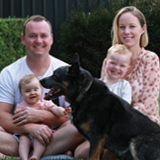I love the beaches in Newcastle. Sitting by the beach helps with my anxiety and my job here is challenging but not all consuming. People in Newcastle appreciate that life is about living, not just about work. City lawyers and those in larger law firms could benefit from that understanding.
We all know the figures – lawyers are more likely to have anxiety, depression and other mental health issues than the general population. On the eve of World Mental Health Day on 10 October, meet five lawyers under 35 who open up about how they manage their mental ill health.
 MICHELLE LARIN
MICHELLE LARIN
moved regional to get some balance
Solicitor Michelle Larin credits two “sliding door” moments for her transformation from a stressed-out corporate lawyer to a 34 year old who combines a well-paid and satisfying legal career with hobbies that make her smile.
In 2013, Larin’s grandfather died a day after she had finished working long and hard on a piece of litigation. “I was fortunate to see him before he died, but it made me think there must be more to life than work,” she recalls.
Three years later, after she had risen to the role of Senior Associate at Clayton Utz, Larin’s parents started talking about leaving Sydney to retire on the NSW north coast.
“Because I had suffered anxiety over the years and went through a severe bout of depression a couple of years earlier, I decided it was important to reassess my life. I knew I wouldn’t have that support network once my parents left the city,” she says.
“I started to think that perhaps Sydney wasn’t the right place for me. I wondered how I would see my family with the 4.5-hour drive when I didn’t get out of work most Fridays until 7pm.”
Larin says she started suffering anxiety in high school, particularly during exams. At university, studying media at Western Sydney University then law at Sydney University, she managed the symptoms, but it became more difficult when she started working in private practice and was putting in long hours.
“I used to wake up in the morning with a sick feeling in my stomach,” she says. “All my muscles would tense up and, at times, I found it incredibly difficult to concentrate.”
Larin says she managed her anxiety without medication and sought help from psychologists.
“I ended up being open with Clayton Utz about the issues I was having and this was met with a lot of support,” she says. “I considered my health and sanity to be key, and thought it better for me to be open and honest about how I was feeling than to struggle through with a smile on my face. Clayton Utz were really supportive and did everything they could to help me with my move to Newcastle, because they knew I needed to effect change in my life.”
While Larin went regional to get more balance, she says she encountered “absolutely no stigma” when she told colleagues and management in Sydney about her mental ill health.
“Being honest about my struggles hasn’t affected my career at all,” she says. “Maybe this is because when I first acknowledged it I was a mid-level lawyer. Getting the help you need to be a more effective and productive employee – and a happier one – benefits not only yourself but the organisation as well.”
Larin is embracing work and life in Newcastle and enjoys weekend drives to see her parents two hours’ north. She took a role at Sparke Helmore, then moved in-house as Legal Counsel at the Port Authority of NSW. As for advice for lawyers, she recommends speaking to somebody if you are feeling bad – and doing it early.
“Everybody goes through tough times,” she says. “One night I was in the office crying at my desk when I made the decision to call a helpline. They talked to me and calmed me down.
“You may think your problems pale in comparison to other people’s problems, but they don’t trivialise it –they see everybody’s problems as valid.”

JOCK LEHMAN
takes medication and surrounds himself with friends and family
Recent law graduate Jock Lehman was 15 when he developed depression and 20 when his father took him to see a psychologist. A few years later, part way through a law degree at UTS in 2014, he considered suicide and was diagnosed with clinical depression. He ended up in the Uspace ward of St Vincent’s Private Hospital for three weeks.
Lehman was given medication, which he still takes today, and is enjoying being part of Tutt Bryant Group, a company in Sydney Olympic Park that leases construction equipment.
“I have on my résumé that I did some mentoring of people with serious depression in the Uspace ward as well as some talks through Batyr, a not-for-profit organisation that helps young people talk about mental health,” says Lehman.
“I was asked about it in my interview for my paralegal job, and the team has been really interested and really supportive. Sometimes I still have what I call ‘down days’ and, because I work part time, I am able to switch my days around if I need to.”
Lehman, 25, says in his teens he thought his negative thoughts were simply a part of regular adolescence. “I was still able to function and study,” he says. “Any anxious thoughts I associated with my own personality, not necessarily a manifestation of any mental illness.
“When I was diagnosed with clinical depression I was conflicted, because I was so adamant that the problem was me and there was nothing that could be done, but at the same time I wanted to believe the diagnosis was true so I could fix it.”
Lehman said once he was given medication he noticed positive changes within a week.
“Having been so sad and so lonely, I didn’t mind telling people I had been hospitalised for depression, because I was just so happy to have come through the other side,” he says.
“I want people to know it is alright to ask for help, and that mental illness is a very treatable thing.
“It’s so important to humanise experiences of mental health. The fact that the leading cause of death for young people between the ages of 15 and 44 is suicide is an alarming statistic, but when an individual’s own experience with mental illness is told and you can hear the emotion in their voice, stigma is broken and people reach out.”
Lehman says he manages his depression with medication, fitness, and surrounding himself with friends, a girlfriend and family.
“The biggest thing I wish the legal profession knew is that depression is an illness just like any other, and it isn’t simply a question of attitude,” he says.
“Just like any disease, depression cannot simply be cured through willpower and state of mind alone. It requires treatment and is an ongoing part of my life.
“It is so tempting during my down days to lock myself away and sleep for as long as possible, but I have come to learn that to do this, with only my thoughts as company, is a dangerous thing.
“If I feel down, I make sure I’m not alone. Being around family and friends is the best thing for me.”
 Jock Lehman
Jock Lehman
If I feel down, I make sure I am not alone. Being around family and friends, such as my godson, George, is the best thing for me.
 SHERA TIONGAN
SHERA TIONGAN
set up her own practice and makes time for things that make her happy
Shera Tiongan had been ignoring the signs for years. In eight years since admission as a solicitor she had gained 30 kilos, lost her characteristic bubbliness, and stopped sleeping well.
Tiongan, 35, studied law at Western Sydney University and worked as an assistant to several judges in the Federal Circuit Court before doing legal work at a few firms. When a role at Mills Oakley came up, she jumped at the chance to work in the firm’s family law practice.
In 2016, the firm responded well when Tiongan admitted the full-time load was too much for her and allowed her to work part time. A few months later, on a day that started with a client meeting in Parramatta at 7.30am, then court, then a meeting in the city office and a performance review before a networking event, Tiongan missed her step at Wynyard and fell down a full flight of stairs.
She ended up in St Vincent’s Hospital for two weeks with serious leg injuries that required months of rehabilitation and three months off work. “The sad part was, I was in hospital thinking, ‘How am I going to get to work?’” Tiongan recalls.
“I dislocated my shoulder in the fall and had to learn to walk again and do months of intense rehabilitation.
“When you have that amount of time by yourself, you do start to analyse and assess how you are living. I realised I was not as happy as I thought I was.
“I accepted that something had to change and that I was seriously stressed. Before the accident, I didn’t realise it but friends and family outside of the legal industry had noticed the change in me. I wasn’t present. They kept telling me I wasn’t my usual bubbly self.”
Tiongan says working at the mid-tier firm offered many opportunities and a lot of support. Still, she felt pressure to work harder and longer.
“Nothing was said directly to make you feel pressured, but you knew that if you wanted to advance, be recognised, or have any progression, you had to put in the hours and the effort,” she says. “With the amount of work I was doing, like many lawyers, I wasn’t exercising or eating properly or really looking after myself. I felt flat and lifeless.”
Shera Tiongan left the firm in September 2016 without another job to go to, but was determined to change her life. She has set up a family law practice in Liverpool near her home and enjoys controlling the hours she works.
“The money is less but the biggest surprise is I don’t miss it,” she says. “My spending is so different and in Liverpool it is a very different clientele.
“I have gone overseas five times in two years, which is more travel than I did in six years. Hikes have been my big thing.
“I joke that the fall down the stairs was a push from the universe, because I wasn’t listening to the warning signs about how unhealthy my lifestyle was.
“I wish solicitors would take care of their wellbeing as much as they take care of their legal practice. Taking care of your wellbeing is beyond just your mental health, it’s about caring for yourself holistically and finding your balance.”
 Shera Tiongan
Shera Tiongan
I was seriously stressed before I had my wake-up call. I have gone overseas five times in two years and hikes (such as this one in Hawaii) have been my big thing.
 MICK BAINBRIDGE
MICK BAINBRIDGE
makes time for the gym and tries to normalise mental ill health
Life near Wollongong for Mick Bainbridge, his wife Brooke and their children Mason, 3, and Matilda, 18 months, couldn’t be more different than the war zones Bainbridge was exposed to in Afghanistan and East Timor as a Green Beret.
Bainbridge, the youngest-ever Vice-President of NSW RSL at 34, is finishing his practical legal training and a combined law/commerce degree at the University of Wollongong. He has come a long way since being medically discharged from the Army for post-traumatic stress disorder and depression after five tours of duty.
He is the first to admit that after his wartime experiences he struggled with his mental health, but has been able to learn more about it, better understanding its effects and how to manage them. Keeping fit, eating well and sleeping better, along with the odd visit to the psychologist, have all been weapons against an injury that once crippled him.
“We lost a lot of blokes overseas and did a lot of killing as well,” Bainbridge says flatly. “We were dealing with confronting and often harrowing experiences and, in the scope of the workplace, everybody was doing it, so nothing seemed out of line. Although I had been through a lot, it was after the Black Hawk helicopter crash in 2010 (in which three Australian Commandos died) that my problems started to surface. I wasn’t sleeping much and I was self-medicating with alcohol. I think at this point I had become emotionally exhausted. I had nothing left to give.”
Bainbridge says it was in 2011 that he realised “the wheels were coming off”. “At that stage I felt as though I had lost my job, and a big part of my identity. It really compounded a lot of my issues at the time,” he recalls. Determined, he enrolled to study commerce/law, not wanting to be on a pension in his 30s. He knew he had to start again with a new career. In doing so, he wanted to be able to give back by helping other veterans and their families with legal matters.
“It was important to be open about my experiences in terms of mental health injuries, in the hope it would encourage others to ask for help if they required it,” he says. “In the past two years in Defence, my own regiment has had five suicides. Last year, veteran suicides hit 85 in Australia.
“I doubt there’s anyone who can say they don’t know someone who has suffered a mental health injury, whether it’s work-related or being witness to trauma or the loss of a loved one. Everyone will react differently, and workplaces need to understand that.”
Bainbridge maintains that mental health issues “don’t make someone a less valuable asset in the workforce”. “If people are supported in the workplace, especially in relation to mental health, they are going to become more resilient, more productive and are likely to become more committed to the job,” he says.
“I feel that my experiences and what I have learnt have improved my ability to be a lawyer. I already have a few offers which I am considering.”
Bainbridge says breaking down the stigma of mental health is important. “When people ask me what they should do, I always say, ‘If I had a broken arm I would get a cast. If I buy a car I would get it serviced regularly – and your mental health is no different’. It may be an oversimplification, but it’s about breaking down the stigma, allowing people to discuss it, get help and lead happier, healthier lives.”
 Mick Bainbridge
Mick Bainbridge
I am so supported by my wife, Brooke, and love our kids, Mason (right) and Matilda. Being honest and dealing with your mental health is a good thing for everybody.
 JOHN CANTOR
JOHN CANTOR
shares his experiences honestly and accepts his limits
It was the heart palpitations and dizziness that had John Cantor most worried when he had his first panic attack 10 years ago.
Having trained and prepared conscientiously for years for a 1,600km trek across the Brooks Range in Alaska, Cantor couldn’t work out why he felt so incredibly unwell the night before his flight to the US.
“I was well prepared and I didn’t really know what was happening, as I had never had a panic attack or severe anxiety before,” says Cantor, 33.
“I had a horrendous night, just feeling like I was having a heart attack. I didn’t tell my father, who is a psychiatrist. I just pushed on so I could get on the plane.”
Cantor says the ailment affects him in the lead-up to the strenuous adventures he trains for, not in his work as a graduate at Minter Ellison.
Three times he has had to turn his back on his goal of crossing the Brooks Range in summer, once evacuated by helicopter and twice turning back so he could fly out on a small plane. On the fourth attempt, in 2012, he completed the trek in a record 31.5 days.
“My attacks are caused by a fear of failure and the fear of dying,” he says.
“In my mind, I was doing something that’s brave and extreme and I felt there was something wrong with me … that I wasn’t tough enough and that I shouldn’t be going out there. I viewed my anxiety as a really bad thing. “
Cantor says he has been diagnosed as suffering a mild panic disorder.
“My disorder is mild because it is it completely normal to be scared about an expedition in which you might die, especially when you have sponsors and media knowing what you are doing and that build up of pressure,” he says.
“It’s ironic. I suffered more anxiety about when I was going to suffer anxiety than the actual anxiety. As soon as I accepted it, I was able to
deal with it a lot more and I didn’t have as many panic attacks.”
Cantor says he manages his panic by “scheduling” his panic attacks.
“I know it sounds strange, but when I have an expedition coming up, I know I am going to have anxiety. So, rather than have panic attacks at times that aren’t convenient for me, I will say, ‘Okay, they are going to occur two weeks before I leave’,” he says.
“For me, it is all about management rather than elimination. My main message is that there is nothing wrong with you just because you are going through mental health issues.”
Cantor is training to traverse the Brooks Range in winter in 2020 and says, “I will convince myself that the panic attacks are all going to occur in the two weeks before I leave”.
“You can use that approach for a whole range of emotions,” he says.
Minter Ellison is sponsoring Cantor in his quest to traverse the Brooks Range in winter and he gives keynote presentations to the firm’s clients as well as to other groups.
“I have a lot of friends and co-workers who have reached out to me because they have seen me talk about my issues,” he says.
 John Cantor
John Cantor
The more people who speak about mental health issues publicly, the more likely it is that people going through issues will reach out to their friends and open up the conversation.
Need help?
The lawyers who have shared their experiences in this story have one common piece of advice: if you aren’t feeling right, speak to someone without delay.
The Law Society has many resources online at lawsociety.com.au/advocacy-and-resources/mental-health-and-wellbeing, including an independent panel of specialists available for confidential wellbeing consultation services. These specialists, ranging from clinical psychologists, GPs and psychotherapists, are available to Law Society members and their families.
Other support services available include:
Lifeline 13 11 14
Beyondblue 1300 224 636
Mental Health Emergency Response Line 1300 555 788 (Metro) or 1800 676 822
Rurallink 1800 552 002
MensLine Australia mensline.org.au
The Black Dog Institute also has resources at bit.ly/2pfClhX




